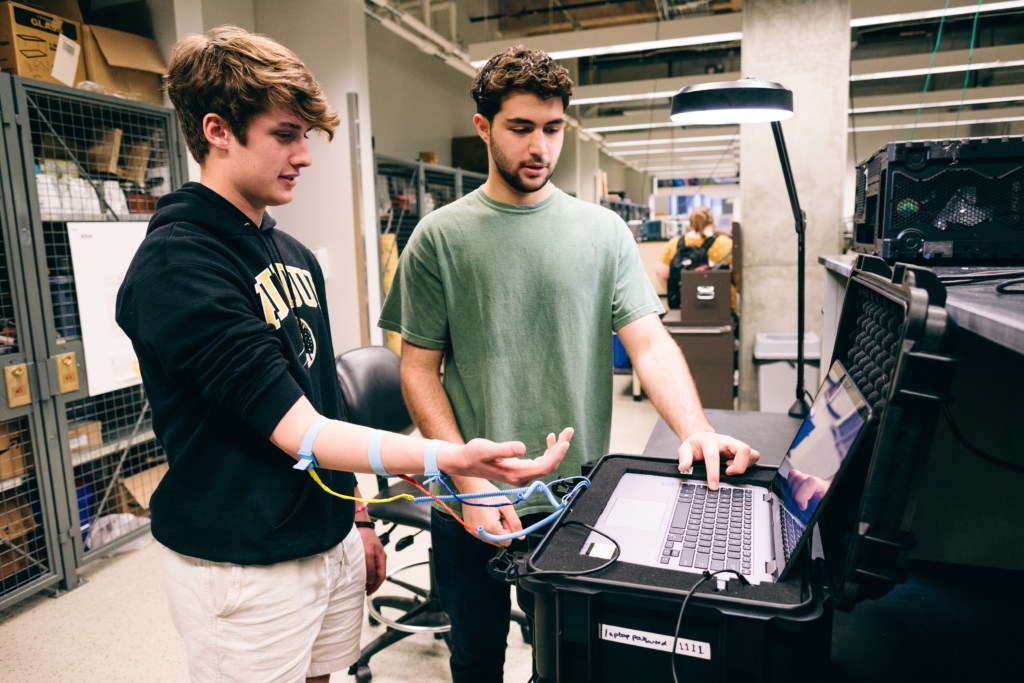
What are the ingredients to a best-in-class business education?
Scribbling out a shopping list, the selective undergrad might look first for experiential learning. In that case, they could consider Marian University of Indianapolis Byrum School of Business in which every freshman creates and manages their own startup in the nine-credit Business Plan Competition Course.
Or, the undergrad might prefer an international perspective. They could then look to New York University’s newly imagined global experience requirement in which every student will embark on a learning journey to a different corner of the world.
Perhaps the student prioritizes career outcomes, a school that offers clear pathways to fulfilling careers. Well, students in the Carolina Finance Scholars program at University of South Carolina’s Darla Moore School of Business regularly secure jobs at top Wall Street firms even though they’re not based anywhere near the coastal financial hubs.
Or, maybe business hopefuls are shopping, first and foremost, for value. Maryland students, then, should give a look to Towson University’s College of Business & Economics. With in-state tuition at just over $10,000 per year, its mission is to turn students into professionals, and it boasts career outcomes that rival those of more prestigious schools.
Each year, Poets&Quants For Undergrads looks for the innovations, differentiators, and other factors that have the potential to reshape business education. From the large and celebrated, to the ambitious upstarts, to the overlooked gems, here are the schools we’ll be watching in 2023.
You’ll find profiles of each in the pages that follow.

Students study at Purdue University’s newly named Mitchell E. Daniels Jr. School of Business.
Purdue University Mitchell E. Daniels Jr. School of Business
So much has been happening at Purdue University’s business school the last six months, it’s almost hard to keep up.
In September, Purdue University announced that it was “reimagining its current School of Management into a new School of Business,” in what it dubbed the last big initiative to be unveiled during university President Mitch Daniels’ decade-long tenure.
Two months later, B-school dean David Hummels, who has led the school since 2014, announced that he would step down in July. A month after that, Daniels retired as university president; Mung Chiang, dean of engineering and executive vice president of strategic initiatives, took over effective January 1.
In February, the business school unveiled its new name: The Mitchell E. Daniels Jr. School of Business. The Daniels School is the umbrella for both its graduate-level Krannert School of Management and its newly named Bruce White Undergraduate Institute. The school also pledged to double the size of its facilities with an expansive renovation plan over the next several years.
Purdue’s transformational plans can be categorized into four main buckets, Hummels explained in this interview from September: 
- Double graduate school enrollment and significantly increase undergraduate enrollment which is already up 33% since 2019. The Daniels School will also hire more faculty (which is up 50% in the last decade), and double the size of its facility through a substantial addition and renovation.
- Continue its focus on STEM-oriented degrees, building upon the success of its Integrated Business and Engineering (IBE) degree launched in fall 2021 as well its highly-ranked business analytics program.
- Center the classical liberal approach in Purdue’s Cornerstone program as a way to think about business problems.
- Expand its experiential and project-based learning so that it’s something all students can deeply engage in, not just the top 10% of superstars. Think undergraduate research opportunities, corporate consulting, and more.
Purdue has pledged $300 million investment into the new school, including a $100 million investment from Purdue itself and a $200 million fundraising campaign. Just last month, the school announced the largest gift in the business school’s history – a $50 million gift from the Dean and Barbara White Family Foundation.
A BUSINESS SCHOOL ON THE RISE
Purdue’s ambitions include becoming a top 10 business school, and its trajectory is moving in the right direction. It ranked No. 29 in our 2023 ranking of best undergraduate business schools – rising an impressive 16 spots from No. 45 the year before.
While the school has doubled-down on its commitment to STEM, its liberal arts foundation provides students the tools to think outside the box.
“I was surprised by how much business requires you to think not only critically, but creatively. Before starting at Purdue, I was worried that I wouldn’t be able to use my creative passions in my classes because of how analytics focused business can be,” says Faith Young, a Best & Brightest candidate for the Class of 2022, who aspires to work as a creative director of a fashion magazine in Paris, France.
“I was happy to find that I could still be my bubbly, creative self in the business world, as it brings a layer of excitement and uniqueness to every project.”
While Purdue is just at the start of its journey to reimagine its business school, it’s clearly and publicly outlined a bold vision backed by significant money and resources. P&Q will certainly be watching what comes next.
P&Q INTERVIEW WITH KELLY BLANCHARD
We reached out to Kelly Blanchard, Associate Dean for Undergraduate Programs, to talk about Purdue’s reimagined business school. Read the interview below.
What are recent and upcoming program developments and innovations that will enhance the experience of future students?
The Mitchell E. Daniels, Jr. School of Business is based on four foundational pillars:
- Transformative education: Students apply their learning to real-world business problems from their first semester to their last. Curriculum and co-curricular experiences are designed to promote critical thinking and problem-solving skills. We’re expanding service-learning partnerships with local businesses and organizations, study abroad and study away opportunities, consulting courses with corporate partners, business problem-solving competitions, and undergraduate research opportunities. Our most motivated students will have the opportunity to take part in immersive learning trips, including on-site leadership training in Gettysburg, NASA excursions that emphasize decision-making and risk, and wilderness treks in Yosemite National Park.
- Integration of technology and business: The future of business is tied to the path of technological development, and much of our growth will focus on this connection. Our integrated business and engineering major is the model for programs that bridge STEM skills with business acumen, and expanded offerings in business and economics analytics further support that focus. In order to affect societal change, leaders and founders of technology companies must master the intersection of business and technology.
- Cornerstone for Business: Based on an approach that revitalized liberal arts curriculum at Purdue and other universities around the country, Cornerstone for Business incorporates “transformational texts” in the history, philosophy, economics, and ethics of business in oral and written communication requirements for every business student. Reflection on the ideas of Adam Smith, Karl Marx, Milton Friedman, and Joseph Schumpeter provides a strong foundation for understanding the fundamental role of business in creating value for our market-based society. In addition, our program will imbue students with strong communication skills that allow them to speak well, write well, and interact well.
- Excellence at scale: The Daniels School of Business will ultimately grow undergraduate enrollment by 60%, to 4,000 students, and will double our graduate enrollments. A new facility of 100K+ square feet will provide active-learning classrooms that facilitate teamwork and discussion in class, lab space that encourages technological applications, and easy access to student services and collaborative spaces. The facility will serve as a bold statement of who we are and what we want to be.
What are your program’s two biggest differentiators from other top undergraduate business programs? How do these prepare students for their careers?
First, experiences are mapped to professional competencies to help students translate what they’ve learned into relevant, career-ready business skills. As a result, they will be able to add immediate value to their employers. Second, our integration with STEM fields at Purdue will allow us to produce graduates who can harness communication skills, hands-on learning, and technological excellence to turn new discoveries into societal change. Big ideas don’t change the world until they go to market.

What separates your graduates from other business school graduates?
The business school has always had a reputation for graduating students with strong analytical skills, and that will continue. Big data is powerful, but the ability to make sound, data-driven decisions is paramount for tomorrow’s business leaders. Our students enter the workforce with analytical experience their peers lack. A renewed emphasis on experiential education combines that strong reputation with hands-on learning that better prepares our graduates for future careers. Purdue has a tremendous reputation for transformation—the university has been ranked in the top 10 for five straight years in innovation and #3 nationally for startup creation—and our students have the opportunity to learn and grow in that revolutionary ecosystem.
Explain the career services, programming, and extracurriculars that give your students an advantage in career outcomes?
In addition to regular career fairs for business students, career fairs across campus are also open to business students. Resume workshops, alumni mock interviews, company site visits, and other opportunities for professional development are always available, but our focus in career development is on solving business problems. Students develop problem-solving skills and confidence through competitions in classes, extra-curricular opportunities, and weekend hack-a-thons. In addition, dozens of student clubs provide service-learning opportunities. For example, the Consult Your Community club supplies consulting services for local companies, while the Student Management Investment Fund researches the stock market and makes actual investments. All clubs can strengthen career-ready skills that prepare students for their future jobs.
What are two key qualities that prospective students must possess to land a spot in your program?
Given our emphasis on analytical skills, proficiency in math that prepares students for the math and stats techniques they’ll apply in their courses is especially important. This is even more true for students in our integrated business and engineering (IBE) and business analytics and information management (BAIM) programs where higher-level math and programming skills are essential. Boilermakers, in general, are known for our “grit”—the combination of passion and perseverance that guides us in tackling problems methodically and thoroughly. We’re looking for students that are excited about finding creative solutions to current and future problems surrounding business and technology.

Kelly Blanchard
When alumni look back on their time in your undergraduate business program, what would they consider to be their signature experience?
Stories I hear from students are rarely about specific events or programs. They’re usually about individual faculty members who introduced new ideas, who invested in them and changed their lives. These experiences for students translate into a vast network of alumni who want to connect with current students as mentors, as judges in campus case competitions, as classroom and forum speakers, and as points of contact for various industries.
What is the most underrated feature of your undergraduate business program and how does it enhance the experience for your business majors?
Our students rank the value of their education and their social experience in the business school very highly. The relatively small size of the Daniels School promotes increased faculty engagement and connection. As a land-grant institution, Purdue’s central priority is the dissemination of learning, delivering higher education at the highest proven value. Research, teaching, and community engagement are designed to spread knowledge to as many people as possible with the goal of finding solutions to problems around the world.
Which employers are the biggest consumers of your undergraduate talent and what have they told you about your alumni that make them so special?
The biggest consumers of new talent among our undergraduates are accounting and consulting firms (PwC, EY, Accenture, Deloitte, KPMG, and Plante Moran), financial services (Schwab, Fidelity, JPMorgan Chase, KeyBanc), consumer products and manufacturing (Amazon, Belden, Pepsi, P&G, Cummins, Kohl’s, Target, and Wabash), medical products (Lilly and Stryker) and technology companies (IBM, Microsoft, and Textron). Corporate recruiters identify strong problem-solving skills and analytical proficiency as common attributes of our students.
What else would you like readers to know about your program?
There’s never been a better time to be a business student at Purdue. The university has committed at least $100 million of the $300 million reshaping of the Mitchell E. Daniels, Jr. School of Business, where students will have more experiential learning opportunities than ever before, and their skills and knowledge will draw employers from the world’s top companies. Our students will lead and found businesses that will bring societal change; they will have a sense of mission and the tools to fulfill that mission in even the most complex enterprises.
NEXT PAGE: University of California-Berkeley Haas School of Business











Questions about this article? Email us or leave a comment below.